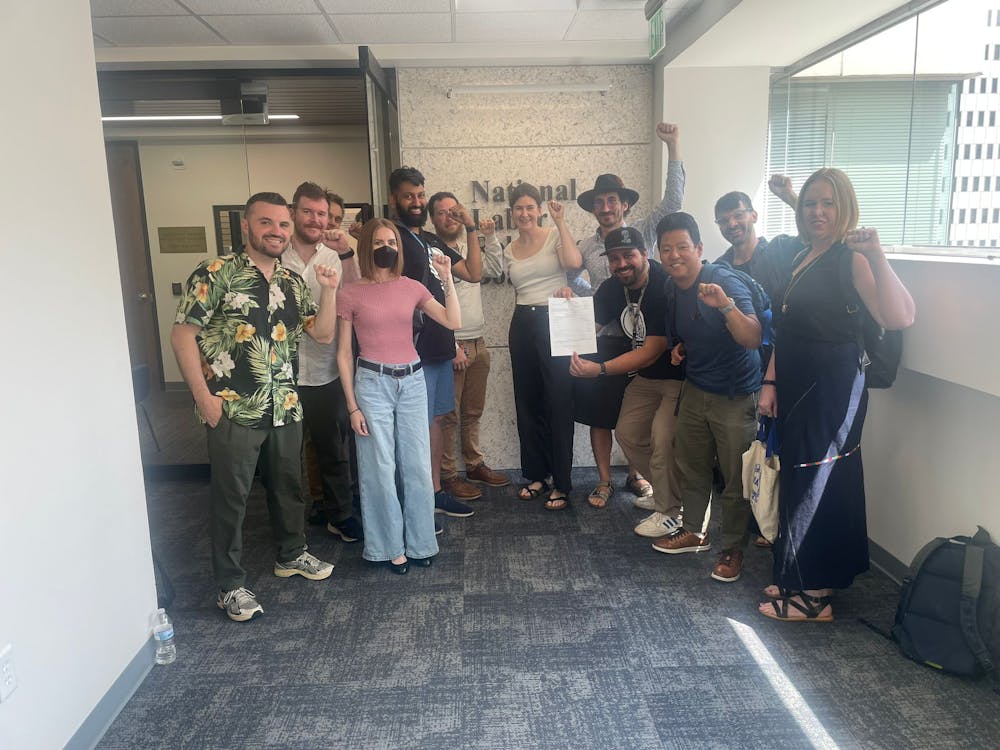The world of electronic music has changed dramatically over the past few years, paralleling the rise of festival culture.
The era of the late 90s — a time when artists, such as Fatboy Slim and the Prodigy, began to catch the attention of young clubgoers and had brief glimpses of commercial success — has developed into a global phenomenon characterized by the fist-pumping basslines of modern-day house, dubstep and “EDM.”
Festivals such as Ultra and Tomorrowland can expect to draw well into the hundreds of thousands of fans, and musicians within the genre have turned their attention away from smaller underground venues to arenas and open lawns packed to the brim with adoring fans.
As the culture surrounding the music has changed, the tools used by electronic musicians also changed. New digital software allows musicians to replicate the sound of analog instruments more precisely than ever before.
The result is that becoming a modern-age rock star may be as easy as picking up a computer; some of the genre’s brightest stars are not yet old enough to have had a legal sip of alcohol.
One of the primary points contended by critics of the genre regards the homogeneity of the music. With the genre still in its infancy, many prominent producers attempt to cultivate similar sounds in an attempt to meet the demands of festival-goers thirsty for the newest “drop.” There remains a great deal of imitation, as these artists hope to capitalize upon the popularity of the genre.
However, a growing contingent of artists continue to explore new means of pushing the limits of what electronic music can be, and they, too, are gaining more recognition for their efforts than ever before.
One of the few artists that does stand out from the rest of the pack is Denis Jarasevic, better known as Gramatik.
His music, heavily influenced by soul and funk, is based off of samples, which he cuts and loops. By combining them with his own synthesized beats, Denis is able to create a composition that is all his own.
His most critically successful song, “Hit that Jive,” was released in 2010. Since then, he has continued to innovate while keeping with the distinctive style that helped his rise to prominence.
His new project, Exmag, is a collaboration between himself and New York-based musicians Eric Mendelson, Tyler Dondero, Mike Ianetta and Illumntr.
I was lucky enough to sit down with Denis and the rest of Exmag before their show at Ram’s Head, Live! on Friday.
TB: How has the music changed over the past few years, as the popularity and the technology surrounding your music has changed?
Denis: It’s evolved immensely with the new computers, technology and algorithms. Everything has been leading up to a point where algorithms are becoming so complex to the point that it’s impossible to see the difference between analog and digital sound.
It’s at the point where 10 years from now there’s going to be a digital program that can emulate any analog sound with such detail that to our ears it’s going to be completely indistinguishable. It’s all a matter of tricking the ear.
In that regard, it has evolved immensely, and that opens up the door for anybody to do amazing sound design, even if they don’t have a lot of money, all they need is a computer.
TB: What drew you to the Exmag project?
Denis: Eric and Tyler started Exmag when Eric was playing guitar for me, when he started out about two years ago, and I pretty much just tagged along as the guy that’s going to make everything sound good.
Eric: We were all living together, so it just kind of happened naturally.
Denis: Eric and Tyler decided to do Exmag as a separate project that would be more mature music with a post neo-soul type of vibe, inspired by Erykah Badu and DeAngelo and Robert Glasper and those guys.
TB: Where do you guys think the Exmag project is headed? Is this a sign of more to come from you guys?
Eric: Me and Bryn actually started off with a computer programming company in new York and that’s how we knew each other. . . Exmag is not just music, it’s...
Denis: In the future with Exmag we want to score movies and do stuff like that. We want to be a production collective of people where we can produce and play and do all kinds of stuff. Eric and Bryn, they program iPhone apps and stuff like that, so we’re multi-directional in that sense so we want to do projects in the future which don’t involve just us sitting down and making an album. We’re looking for multimedia. We already have enough material for three or four albums.
TB: So Exmag is post-neo-soul on the music side, but it’s obviously much bigger than just music. What would you say is at the core of the Exmag creative mentality?
Tyler: We all just sort of came together in our own way, and we live off the same money and eat the same food. Me and Mike live in the dining room and sleep together; we’re just sharing everything.
Eric: We just keep making stuff, and the project creates itself. It’s been going more towards an electronic direction.
Tyler: It’s just been a really fun year of collaboration, getting to know each other better.
Denis: We want people to know that it’s not just another “EDM” project, it’s way beyond that; it’s music that we want to do at any given moment. We might do anything, we love all these different genres and we never want Exmag to be associated with just one type of music. We’re a production collective.
Eric: We’re really just trying to continue growing together musically. Everyone keeps rubbing off on one another.
Denis: There it is. It’s about the experience, the journey. To get these really really talented people together, living with each other and learning from each other — that’s more important than any album or individual song we can make. And that’s the same for all of us.
TB: What tips would you give to any students trying to get involved with a project like this, either musically or on the production side?
Denis: My first piece of advice... just YouTube and Google everything. Everything is out there. There’s a “how to” video on Youtube for everything... there’s five on every topic. Anytime someone asks “How did you learn that one?” I just say I looked it up on YouTube. Since 2005, everything is out there.
Eric: If you want to do music, you definitely should get some keyboard lessons.
Denis: On the musical side rather than the technical side, the keyboard is number one. That will open up your mind to everything else. For the technical side it’s even easier. For the musical side you have to have the ear, you have to understand the basics and be wired that way at least a little bit. But the technical side is easier to learn, it’s more of an engineering perspective. You’re good at math, and that’s gonna be really easy for you.
Eric: One more thing, I wanted to add this earlier...I think it’s cool that with the improvements in technology and production, kids don’t spend all their time just learning one instrument and instead learn how to assemble a song. So I think the quality of music in the electronic world...they’ll be pushing the music differently.
Tyler: The minds of kids can wrap their head around different ideas nowadays.
Denis: The question isn’t about the mastery of an instrument any longer, it’s "How can I make a song?" Now it’s all about the song. . .When you can start something with samples in the sequencer to get a basic idea of how to create a song, it definitely brings the evolution of everything much further than it was before.
Exmag were the first to take the stage, and, while the audience might not have expected a live band at this performance, they quickly won over the crowd with their funky sound.
A cover of Blackstreet’s “No Diggity” was an early highlight as Exmag’s soulful rhythms kept the crowd dancing for the duration of their set. As the musicians switched between different instruments, the interweaving of the keyboards, guitar riffs and effected vocals carried throughout the venue. It was easy to understand why Denis and the band had been so excited about this project, as the music they produced blended together the soulful roots that characterized Gramatik’s music with some masterful instrumental performances.
Halfway through the set, Gibbz, a pear-shaped singer and producer for the band, emerged on stage to much fanfare.
In a set full of surprises, the portly frontman’s rendition of “Tilt Mode” was perhaps the biggest surprise of them all. His sweet tenor crooning was complemented by his rock star persona; his on-stage bravado was unparalleled by the rest of the night’s performers.
Next up in the evening’s lineup was Herobust. Taking the stage to spin a DJ set, Herobust thoroughly changed the mood, rocking the venue with his heavy bass rhythms. As the tracks ranged from dubstep to trap to progressive house, it seemed each drop was heavier than the last. The speed and energy with which Herobust switched between tracks was notable, and the variety and pace of the songs he dropped were unrelenting and powerful in all the ways the audience had expected.
Finally, the headline act, Gramatik, took the stage, bringing with him Eric Mendelson, the guitarist for Exmag. As Denis began to bounce methodically over his mixer and laptop, Eric riffed along, providing a new accompaniment to many of Gramatik’s familiar tunes.
The musicianship of the pair was evident in the dialogue between their instruments, as Gramatik manipulated his music to keep up with Mendelson’s riffs, which were in turn based off of the drums, bass and samples Gramatik continued to drop. The back and forth made for an exciting twist to the night.
“It was really cool how this time in particular he went out with a member of exmag and played a different style of music than he usually does,” sophomore Eva Pratt said.
Sophomore Nicole Tettke also commented. “In my opinion what sets Gramatik apart from every other that I’ve ever seen was the live music element that he included. I really enjoyed the guitar breaks in between the intense EDM music,” Tettke said.
The message that stuck with me after speaking with Gramatik and the rest of Exmag was their hope for the future of electronic music. Whereas now, synthetic instruments and compositions made in computer programs rather than on paper are associated with a particular style and genre of music, their potential applications are limitless.
There’s a world of possibilities out there for a new generation of musicians to access through the advancement of technology, and Gramatik is sure to be a part of it.




